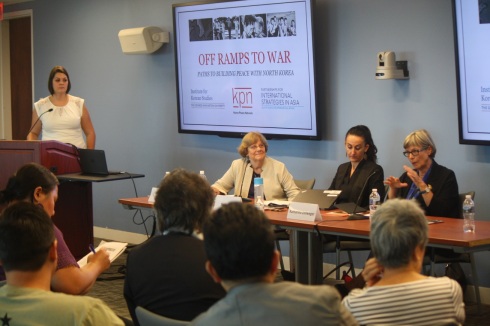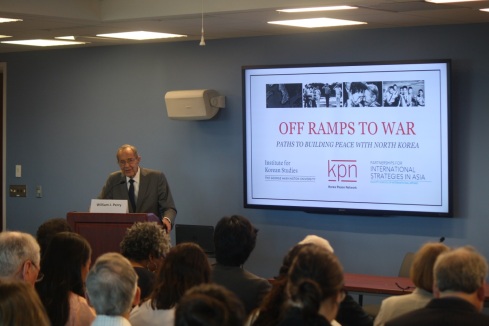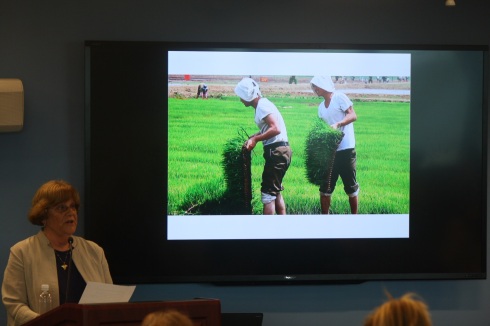Reconciling ongoing Korean War trauma, volatile U.S. relations and current events, amid a growing hunger epidemic among the North Korean people

PISA 2017
By, Maggie Nelsen, PISA Program Assistant
June 13th, 2017, Partnerships for International Strategies in Asia (PISA), George Washington University’s Institute for Korean Studies, the American Friends Service Committee, and the Korea Peace Network hosted a day-long program considering how to forge “Paths to Building Peace with North Korea”. The event could not have been more timely. The overall theme of the day focused on shifting US foreign policy “off-ramps to war” and working towards diplomatic relations with a humanitarian assistance focus. Only half-way through 2017, North Korea and the U.S. are already on a collision course for the most likely military showdown in years. Unprecedented new leadership in the U.S. decidedly swerving away from previous administration’s approach to North Korea has many in Washington and around the world on edge over imminent confrontation between the two countries.
The program’s distinguished panelists and keynote speakers from various fields and direct experiences generated a dynamic discussion about the North Korean regime, its global interests, economic welfare, people of the country, and shared history with the U.S. The event, hosted at the Elliott School, occurred the very same day North Korea released a young American, Otto Warmbier, who was imprisoned for over a year. At first, news of his release provided timely validation for the idea and feasibility of peace in North Korea. In a program about deescalating tensions and eventually moving towards normalizing relations, the initial announcement of Warmbier’s release brought a new element to an already complex discussion among presenters.
The day’s first keynote speaker and panel provided a historical lens to the prospect of peace, integral to understanding contemporary issues in the Korean peninsula and Korean-U.S. politics. Bruce Cumings offered an insightful overview of diplomatic history in the past 10-20 years between the U.S. and North Korea. Both keynote speakers of the day in fact, reflected on the historical trajectory of U.S.-DPRK relations amounting to isolated moments of hope or success that could not be sustained across multiple U.S. administrations. This lack of continuity from administration to administration, led to scattered U.S. attempts with North Korea that never evolved into a clear U.S. strategy.
As the morning continued, participants heard an in-depth account of the largely unrecognized reality of ongoing Korean War trauma amongst Americans, South, and North Koreans. Panelists from varied backgrounds found commonality in the unending repercussions of the Korean War: tragically separated families, soldiers still MIA, POWs who never returned, and unknown Korean War remains between the DPRK, US, and ROK. With bodies that were never recovered and families that were never reunited, this is a war that continues to resonate in a tangible and concrete ways. For thousands of people, their suffering is ongoing for more than sixty years. Gaining closure and healing the legacies of the Korean War is surely an essential step to building cooperation, stability, and ultimate peace in the peninsula.
Preeminent keynote speaker, former U.S. Secretary of Defense, William J. Perry, offered a brief, but decisive commentary and judgement over the current dangerous state of the DPKR-U.S. relationship. A key player amongst a small team of analysts during the Cuban Missile Crisis, Secretary Perry knows better than anyone the very real threat and grave magnitude of being on the brink of nuclear war; he believes the U.S. and North Korea are now on a path to nothing less than that. While Secretary Perry recognizes stopping North Korea from continuing nuclear testing is an ambitious goal, he is confident that there is a sincere opportunity for resolving the nuclear issue, and relations with North Korea do not have to be a lost cause. Contrary to popular belief, Perry emphasized that North Korea “is not crazy” and is in fact, ‘rational’. But, in order to move to a better place with North Korea, the United States must begin to listen to DPRK in earnest; six party talks have gotten the U.S. nowhere. Perry stated the U.S. and South Korea can help create “an environment where the North recognizes the possibility of normalization without having to threaten other nations”.
As the details surrounding Warmbier’s release unfolded this week, the context of his homecoming became increasingly sinister. While Warmbier’s medical state holds disturbing implications for what happened to him during his imprisonment, his sole release—while three other Americans remain detained—perhaps indicates calculated and strategic thinking of DPRK leader, Kim Jong-un. Warmbier’s coma decreases the likelihood of constructive interactions between the U.S. and North Korea in the immediate future. However, his release does indicate, as many media reports suggest, that Kim Jong-un does not want an American dying on his soil. This presumption alone reveals a great deal: Kim Jong-un would never want to completely burn all bridges between Pyongyang and Washington.

Secretary William J. Perry PISA, 2017
The final group of panelists of the day offered a seemingly apolitical approach to engagement with North Korea—humanitarian aid. Some might be surprised to learn that there is in fact a significant Western—including American—humanitarian presence in North Korea. Panelists representing the UN and other respective aid NGOs discussed the impactful development work of their organizations in the agricultural sector, while also shedding light on a widely ignored hunger crisis in North Korea. The panelists focused mainly on their inroads in providing greater nutrition, female empowerment, jobs, and agricultural innovations. But the larger idea here was how these contributions—and aid in general—can influence local population and trail blaze for informal diplomatic relations between the U.S. and North Korea.
Presenters made the careful distinction between human rights work and humanitarian aid work. While both share a common goal of helping the Korean people, organizations have different approaches to going about it. It is important the international community understand this distinction, wherein aid work is not compromised or halted in the event of push-back against parallel human right activities. The continuation of successful development projects in North Korea is already a precarious endeavor, but is also further compounded by huge proposed budget cuts to foreign aid under the new U.S. administration. Moreover, U.S. long-standing and increased economic sanctions on North Korea also negate the work of development programs and winning the hearts and minds of everyday North Koreans. While humanitarian operations face many challenges, aid just might be the U.S.’s best bet to cultivating connection and cooperation, fostering peace and trust, and eventually to building real diplomatic dialogue in the future.

Linda Lewis discusses how innovative rice trays increase productivity by 15%, PISA, 2017
As the event came to a close, audience members were left with a deeper appreciation for the many inter-woven issues involved in building peace with North Korea. As one attendee described, the event was ‘intense’. PISA and its co-sponsors were honored to convene a gathering of thoughtful leaders and experts from diverse backgrounds. The program was ultimately able to offer a comprehensive and holistic framework for examining how to work with North Korea—and not against it or in rival of it. Identifying the many challenges, in turn reveals the many different solutions for building peace on the peninsula. The takeaways and themes from the day’s discussions and observations will no doubt stay relevant, given the anticipation of new South Korean President Moon’s official visit to the White House later this month. Yesterday, President Moon, announced his country’s willingness to re-open engagement with North Korea on the 17th anniversary of the June 15th Joint Declaration. The program, coupled with this week’s news, engendered a mixture of hope and apprehension for the future. But perhaps President Moon sums it up best as he says, “crisis is an opportunity”.



Leave a comment